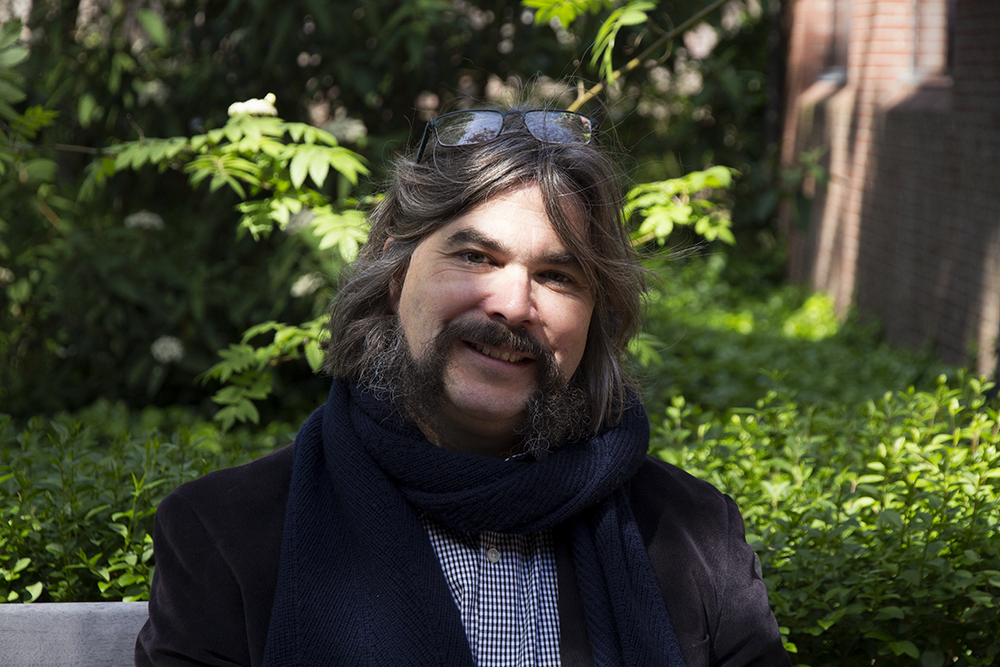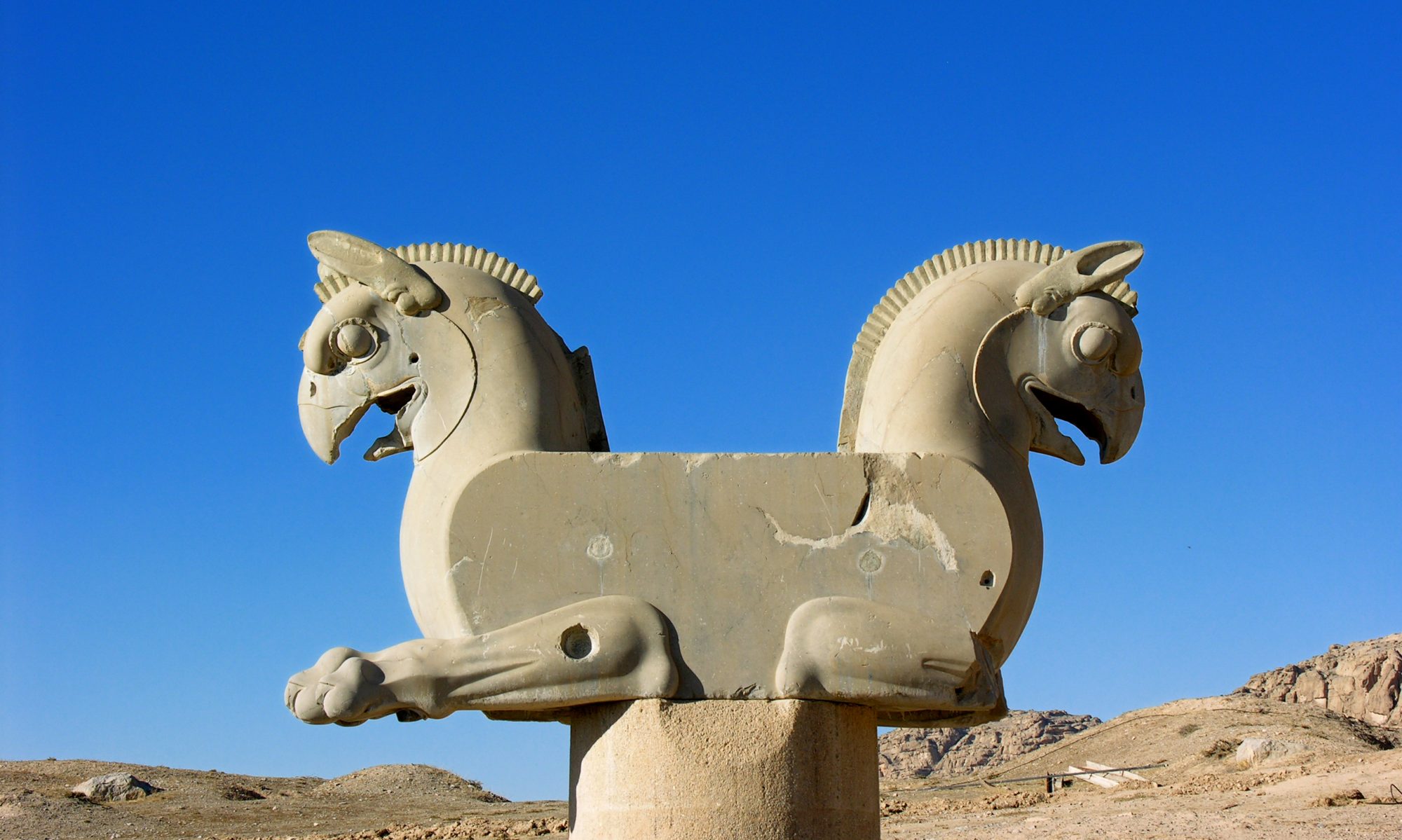By Uzume Wijnsma
Dr. Seth Richardson is a historian who mostly studies the Old Babylonian period (ca. 2000-1600 BCE) of ancient Iraq. Among his topics are the ancient state and political legitimacy. In 2017 he gave a guest lecture at Leiden University.
First things first: Why did you choose to go into Assyriology?
That’s a very difficult question. I suppose everybody’s answer will be different. Mine, maybe, is even more different. I was a historian, I knew I wanted to study history, and I took some years to try and figure out what historical discipline I would choose to work on in graduate school. At a certain point I really decided, mostly as a reaction to having done American history, that I wanted something that did not have a lot of boundaries. I didn’t want something very ‘pigeon-holed’, so to say. So I decided I was going to do world history. This was a great, grand idea: there are people who do world history.

Meaning the history of everything in the world, or…?
Well, it’s mostly a comparative discipline. I think most world historians work on comparative topics, issues across time and space; they don’t pretend to actually be historian of everything and everywhere. So I went, on the advice of a friend of mine, to talk to Richard Bulliet, who is the dean of world history in America. He is editor of the Columbia World History Encyclopedia and quite a well-established scholar in medieval Islamic studies himself. I described to him in as much detail as I could what I wanted to do, and he sort of listened to me very patiently – well, not actually very patiently – while he was eating a cheese sandwich. And I think he decided before he was half-done with the cheese sandwich that he wanted nothing to do with me and my hippie-dippie ideas. He said ‘Well, you know, if you want a big time period and sort of work on all kinds of things, language and horses and gold and war and all this stuff, you should go see this guy.’ And he wrote down the name of Marc Van De Mieroop on a piece of paper, gave it to me and said ‘you should go do Assyriology’. So I did.
You say you don’t want boundaries in your work, but don’t you think Assyriology actually presents limits on what you can do due to the nature of our evidence? (i.e. fragmentary and sometimes very little sources)
Not at all, no. I feel more that Assyriology is something like an Alice in Wonderland house: it looks very small and particular from the outside, but once you get inside you do have an enormous range of topics, which frankly not many people have worked on. For many important topics you can really name on one hand the number of people who have treated that material.
So there’s a lot of room for new people to get in there and search for new interpretations of material?
That’s right. I think there’s a great flexibility. Now, it’s true what you say about limitations. And I think we think about limitations a lot – almost to the point of obsession. That’s important in the sense of treating evidence, that we know about the limitations that the evidence gives us. But I think we make a category error when we extend those kinds of limitations to questions. The questions you ask should be as large as you want them to be. You might not always get them answered, or answered in the way you want, or answered as certainly as you want, but I really think that we’ve somehow let the limitations of evidence really dictate and circumscribe the kinds of things we want to know. There are lots of intellectually valid questions that might not get clear answers – but that’s not a reason to not ask those questions.
You say we are obsessed with limitations. Do you think that applies specifically to Assyriologists and maybe Egyptologists, more so than for – I don’t know – Biblical studies or Graeco-Roman studies?
Well, I don’t think it’s different to the extent that we feel constrained. I think those constraints are always there – even for people who work with modern archives, where the problem is the opposite: you have too much information to be able to get a clear view of it all. So that problem reproduces itself, no matter the nature and the extent of the evidence. That’s just a problem of epistemology, really. But what is different, in those examples you raise, is that those are closed corpus areas. No one there imagines, in Graeco-Roman or Hebrew-Biblical studies, that the way you’ll get an answer to whatever question you have is that you’re going to find a new text. Whereas that is something you could reasonably expect for a good deal of Assyriology’s topics. There are exceptions to that, but in general there’s still the excitement of discovery: you can find a new text that says something new.
I’ve read some of your articles and I’ve noticed that you use a lot of non-Assyriological work in your research, such as theories from sociology or political science. How do you go about that?
I will be honest with you: I’m a very shallow reader in social science theory. No one should imagine, because I’ve cited a few works, that I know a lot about anthropology or political science or something like that. In general, I’m forming my studies first and then looking for analogues after the fact. I think if I we’re really trying to pull the wool over people’s eyes, and say ‘I’m a political scientist’, that would be pretty reprehensible. All I’m honestly trying to do is really connect with people who work in other disciplines, and to use those conversations as a way to say ‘hey, you work on non-state actors, I work on non-state actors – let’s talk’.
So it’s more of a comparative approach?
Yes. I would say it’s not particularly hard to be as shallow as I am about that. But I take the issues quite seriously. For example, just to pick the largest center of gravity in that kind of work: I’m trying to find ways of moving away from ‘the state‘ as the center of the narrative. I think states too much form not only the subject matter but also the viewpoint of research. So, if there is one thing that sort of encapsulates my attempt to invert this view, it’s a map I had made of Babylonia that shows the area of land that was not populated, that was not or only thinly settled. For example, in the period I study (the Old Babylonian period) the modal form of living was in settlements smaller than two hectares. We’ve done very little to think about the experience of people who don’t live (directly) under state rule. And I do not mean to set up a radical juxtaposition between people who did and did not live under state rule – I don’t think that’s true. But what I do think is true is that a lot of people lived much more conditionally around the periphery, where their mode of engagement with the state was very limited. There is one influential history teacher who used to say: ‘Before the civil war in the United States, the only time you would come into contact with the federal government was if you bought a postage stamp.’ There was no income tax, there was no national draft. The forms of national experience that we have now just did not exist. If you bought a stamp and went to the post office, that would be your big contact with the government. I think that’s largely true for pre-modern society no matter where you go.
Do you think the model of the state that we’ve created (in, say, the 18th-19th century) is now so ingrained in our thinking that we see it everywhere, and mirror it on pre-modern societies?
Yes. Even though we give lip service to the idea all the time that all of these ancient states are not like modern national states, we still talk in those terms about Babylonians and Larsans and Urukeans and etc. Certainly these people didn’t think this way.
So do you feel that a lot of political science theory, concepts like political legitimacy, are formed in frameworks that take the modern times for granted? And that it cannot be applied to pre-modern states? Should we find new concepts specifically for ancient experiences?
Yes. Yes, I do. I mean, I’m not sure that I’ve done very much to move the ball down the field in that area. One particular idea I’ve had recently is to focus on the word ‘legitimacy’ itself. Because of course it comes from Latin ‘lex, legis’: it is rooted in law, it is rooted in an idea that political authority is legally prescribed and bounded. In fact, this has nothing to do with Mesopotamian kingship. In all of Mesopotamian laws, even if you were to look from a legal point of view, I think there is one Middle Assyrian law which constrains the action of a king. And one law of Hammurabi’s, which prescribes something that the king must do. The king’s authority is not rooted in law. That’s not where it comes from. So, yes, we have to find something else, another word to describe it. I think we have actually known the answer for a long time but we haven’t done a lot to develop it – and that’s the idea of clientage. I think for quite proper reasons we’ve shied away from feudal models as a way of a talking about Mesopotamian kingship, because of the particular relationship of land to people that the medieval European feudal model requires. But what we haven’t developed as much is a language to talk about clientage as the social contract that forms royal authority. We can use legitimacy as a rubric for that, taking the legal idea out of the center of it. Any time we talk about the king as shepherd we start to get at that idea. So I don’t think there’s really a terribly new idea behind it. What remains is to sort of start talking about it in historical terms. To start talking about how what specific kings did and what specific states did was a matter of trying to recruit and retain clients. People. Where now we talk mostly, particularly, in military terms about land. You know: ‘Shulgi conquered this place’; ‘Hammurabi conquered this place and then he had it’. In point of fact, Hammurabi tries to control very few of the places that he conquers. Larsa, that’s about it. The other places: he just wipes them out. But I think if we move away from the conqueror-king model then we can see a much more common kind of rule which is based on trying to solicit people as clients and maintain them. So that’s what I talk about in the Presumptive State article: that idea of gathering people back in is really about authority as deriving from people who recognize you.
Just to pin-point on legitimacy: Weber has this famous tripartite theory of the sources of legitimacy, namely tradition, charisma, and legality. Do you feel that those sorts of categories are still helpful in trying to look at pre-modern states?
Well, I get out of a lot of my problems by making recourse to an idea about ambiguation: that power works partly by deliberately confusing you about the bases on which you are being made a subject. Subjectivity is formed partly by hiding from you whether or not a king has this kind of authority or that. So in other words, why is it that a king has divine authority to carry out war, or a legal basis to reorganize land? If you stop and think, these things are not naturally married to each other. And so power is explained to people and communicated to people in different registers constantly. It’s never just one: the important thing is that it is never simply one rationale for authority that is given.
And you think that was done consciously?
Consciously and unconsciously. I honestly think that it would be impossible to assert authority only on one of those bases. Simply because even if you would convince one group of people you would not convince another. One basis only recruits one base. We currently have a form of government, or a leader, who may actually have NO base of authority and you see how well that works. It’s very narrow, it’s not very stable. It’s not only that it’s hidden or not hidden, or conscious or not conscious, it’s the fact that I don’t think it could work in any other way. It’s certainly a trick to make all those things seem natural. Naturalizing authority is always a political project.
That sounds as if you see parallels between modern attempts at legitimacy and those of ancient times.
I think that what is different nowadays, if there is anything different, is the self-consciousness of modernity and post-modernity. That we think we know the tricks, we’ve seen the man behind the curtain, we know the way the sausage is made – how many more metaphors can I use. But what’s harder to recapture is the sense of what it was like to think about political authority before that legal-rational moment. Before we lived in constitutional states, national states with national language, national press, and all of those tools we use to imagine legitimate political authority as built in this way. You know, I remember reading Thomas Carlyle’s French Revolution, which is an amazing book. And there is this wonderful sort of recurring motif about his account of the writing of the French constitution: he makes wicked fun of this idea that a document, a piece of paper, can grow legs and arms and a head and get up and walk and that a nation could be ruled by a piece of paper. It’s sort of that last gasp of pre-modern mentality, when the idea of government or legitimacy being formed by an abstract set of rules still seemed like an alien notion. ‘Well, how could you do this without the divine authority of a monarch who cared in his heart for his people’. And I think we’ve lost the ability to take that sense seriously. And to understand that as a subjective experience. Because I think what is hardest for all of us to imagine is why anybody who ever read or heard a royal inscription, or any piece of Mesopotamian propaganda, would ever have believed it.
Yeah, we’re cynical about that.
We’re very cynical about that. And that’s a big part of the limitation that you started with: we really think that a lot of our sources are just lies. And we don’t know how to hear them as coded language which evokes certain kinds of ideas.
Thank you so much for this interview, Seth. Just to top it off: what kinds of topics or projects are you working on at the moment?
Well, I’m working on a project about divine emblems, and about a princess of Old Babylonian times. I have a project on law as an infrastructural power, law as a genre of literature, and how that enters into society rather than just as a set of legal decisions. And of course I work on cuneiform, Old Babylonian cuneiform – that is my terrible affliction and first love.

